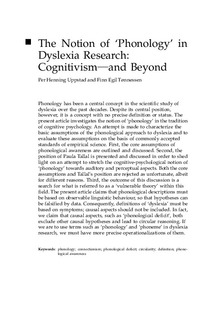| dc.contributor.author | Tønnessen, Finn Egil | |
| dc.contributor.author | Uppstad, Per Henning | |
| dc.date.accessioned | 2013-04-18T10:57:59Z | |
| dc.date.available | 2013-04-18T10:57:59Z | |
| dc.date.issued | 2007 | |
| dc.identifier.citation | Uppstad, P.H; Tønnessen, F.E. (2007) The notion of phonology in dyslexia research : cognitivism - and beyond. Dyslexia, 13(3), pp. 154-174 | no_NO |
| dc.identifier.uri | http://hdl.handle.net/11250/185924 | |
| dc.description | This is the pre-peer reviewed version of the following article: Uppstad, P.H; Tønnessen, F.E. (2007) The Notion of Phonology in Dyslexia Research : Cognitivism - and Beyond. Dyslexia, 13(3), pp. 154-174, which has been published in final form at : DOI: 10.1002/dys.332. | no_NO |
| dc.description.abstract | Phonology has been a central concept in the scientific study of dyslexia over the past decades. Despite its central position, however, it is a concept with no precise definition or status. The present article investigates the notion of ‘phonology’ in the tradition of cognitive psychology. An attempt is made to characterize the basic assumptions of the phonological approach to dyslexia and to evaluate these assumptions on the basis of commonly accepted standards of empirical science. First, the core assumptions of phonological awareness are outlined and discussed. Second, the position of Paula Tallal is presented and discussed in order to shed light on an attempt to stretch the cognitive-psychological notion of ‘phonology’ towards auditory and perceptual aspects. Both the core assumptions and Tallal's position are rejected as unfortunate, albeit for different reasons. Third, the outcome of this discussion is a search for what is referred to as a ‘vulnerable theory’ within this field. The present article claims that phonological descriptions must be based on observable linguistic behaviour, so that hypotheses can be falsified by data. Consequently, definitions of ‘dyslexia’ must be based on symptoms; causal aspects should not be included. In fact, we claim that causal aspects, such as ‘phonological deficit’, both exclude other causal hypotheses and lead to circular reasoning. If we are to use terms such as ‘phonology’ and ‘phoneme’ in dyslexia research, we must have more precise operationalizations of them. | no_NO |
| dc.language.iso | eng | no_NO |
| dc.publisher | Wiley | no_NO |
| dc.subject | phonology | no_NO |
| dc.subject | connectionism | no_NO |
| dc.subject | phonological deficit | no_NO |
| dc.subject | circularity | no_NO |
| dc.subject | phonological awareness | no_NO |
| dc.subject | dyslexia | no_NO |
| dc.subject | dysleksi | no_NO |
| dc.title | The notion of phonology in dyslexia research : cognitivism - and beyond | no_NO |
| dc.type | Journal article | no_NO |
| dc.subject.nsi | VDP::Humanities: 000::Linguistics: 010 | no_NO |
| dc.source.pagenumber | 154-174 | no_NO |
| dc.source.volume | 13 | no_NO |
| dc.source.journal | Dyslexia | no_NO |
| dc.source.issue | 3 | no_NO |
